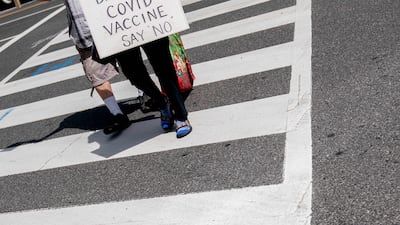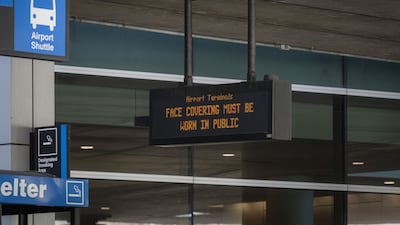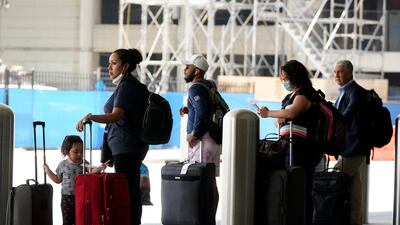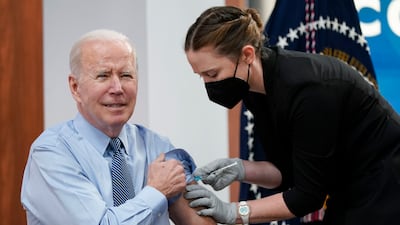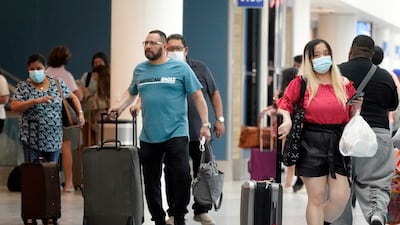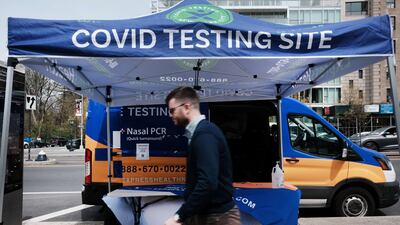After more than two tumultuous years, American workers are returning to the office, millions more people are boarding planes — with no US federal travel mask mandate in place — and the Coachella music festival is back.
But even as many in the US are desperate to put Covid-19 behind them, President Joe Biden announced the country's sombre milestone of one million virus deaths on Thursday and said that the pandemic is not over.
Daily cases and hospital admissions are rising yet again due to competing Omicron subvariants that are even more contagious than previous strains.
“We’ve made a choice,” Dr Maureen Miller, an infectious diseases specialist at Columbia University, told The National.
“We’re willing to deal with high levels of preventable death and likely long-term negative health impacts due to Covid infection in exchange for a sense of normality now.”
The US currently has a death rate that is higher than other countries of similar size and wealth.
At least 58 per cent of the US population has tested positive for coronavirus and about half of that amount was infected during the biggest surge of the pandemic, driven by the highly contagious Omicron variant.
The US government also estimates that 23 million Americans are dealing with lingering symptoms following infection with coronavirus — a mysterious disease called long Covid.
But the US has more tools than ever before to both detect and fight the virus, adopting national wastewater surveillance and the widespread distribution of free rapid at-home tests. Vaccines, booster doses and post-infection treatment are also available, including Pfizer's paxlovid antiviral pills.
“The US is in a much better place in the pandemic today due to the tools that have been developed and the high levels of immunity in the population,” Dr Amesh Adalja of the Johns Hopkins Centre for Health Security told The National.
There are caveats, however: at-home tests are not being recorded nationally, making it difficult to track Covid surges; both vaccination and booster uptake has been weak compared to other countries; and distribution of antivirals such as paxlovid has been slow and uneven across the country.
“The US needs to continue to keep abreast of Covid variants, ensure availability of antivirals and monoclonal antibodies and have strong situational awareness of hospital capacity concerns if they occur again,” Dr Adalja said.
Federal funding has also dried up, leading to the closure of many testing sites and ending support for uninsured people looking to get tested and vaccinated.
Mr Biden proposed a $22.5 billion plan that would rectify those cuts and help tackle other issues. Doctors and public health officials praised the plan but the bill is stalled in Congress.
A group of senators countered the legislation with a $10bn bill that omits international aid.
“I am very concerned about funding for the ongoing pandemic response,” Dr Syra Madad, a senior director at the New York City's Health + Hospitals, the nation's largest public healthcare system, told The National.
She was part of the city's test-and-trace system, which recently wound down operations.
The Biden administration asserted in a handout on April 27 that unfulfilled funding would result in fewer vaccines for Americans — including booster doses if they are needed later this year.
It would also mean the US cannot stockpile tests and treatments or send vaccines to countries in need.
“The US has just recently pivoted its pandemic response from reactionary to being more proactive, less 'just in time' to a bit more 'just in case' with the White House’s National Covid-19 Preparedness Plan,” Dr Madad said.
“Just in case” allows for preparation and prevention as opposed to scrambling to address surges “just in time”.
California in February announced the first state “Smarter” plan, which sets up funds, stockpiles and systems to meet future Covid-19 surges.
It was considered one of the first official approaches of treating Covid as “endemic”, something that some — including the World Health Organisation — say hasn't been achieved yet.
A disease is “endemic” when the virus is still present but is manageable either through widespread immunity or treatment.
However, such a definition may still result in a large amount of severe illness and death for the US annually.
Most estimates say 10 to 30 per cent of those infected with coronavirus could end up suffering from long Covid, adding to the number of disabled Americans as scientists race to uncover the mysteries of the illness.
The country could register between 40,000 and 300,000 Covid-19 deaths each year, a Rockefeller Foundation report said in March.
The researchers behind the report say Covid is likely to cause more deaths than the flu, which the Centres for Disease Control and Prevention (CDC) says kills between 12,000 and 52,000 each year on average.
Vaccines and timely boosters are still the best tool against severe illness and death from the highly contagious variants today, although precautions and prevention should still be a priority for some vaccinated populations.
Of the roughly 66 per cent of the US population that is fully vaccinated, CDC data show that half of that amount has received at least one booster.
Despite this, a Kaiser Family Foundation report found that vaccinated adults represented as much as 42 per cent of Covid-19 deaths in January and February this year, with most of the deaths among the elderly.
The report suggests that utilising tools and continuing some level of precaution may still be worthwhile to prevent disability from long Covid or possible death among vulnerable populations.
But if Mr Biden's plan is not funded, these “tools” would be moot if they are not available for those who need them most.
“We’re already seeing the US response: 'People, you’re on your own',” Dr Miller said.
“There is a notion that somehow personal responsibility and mass vaccination will save the day — even though it hasn’t done so yet and is unlikely to do so in the future.”





